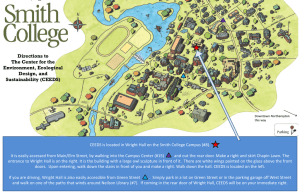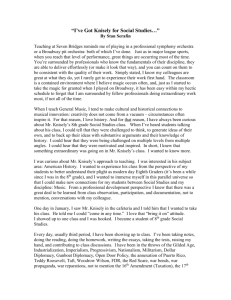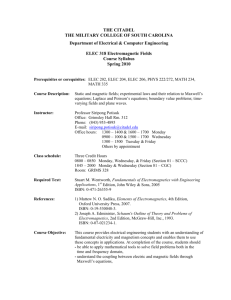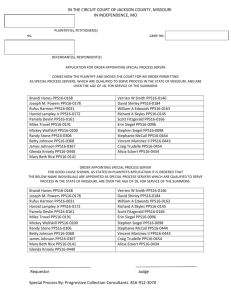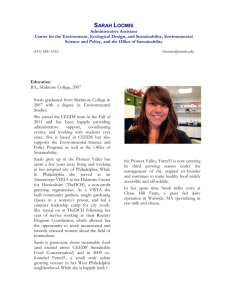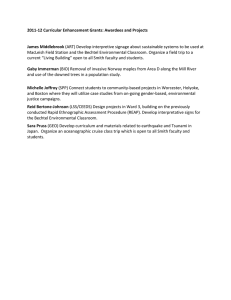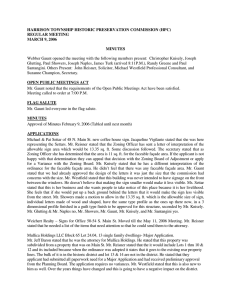Course Information
advertisement
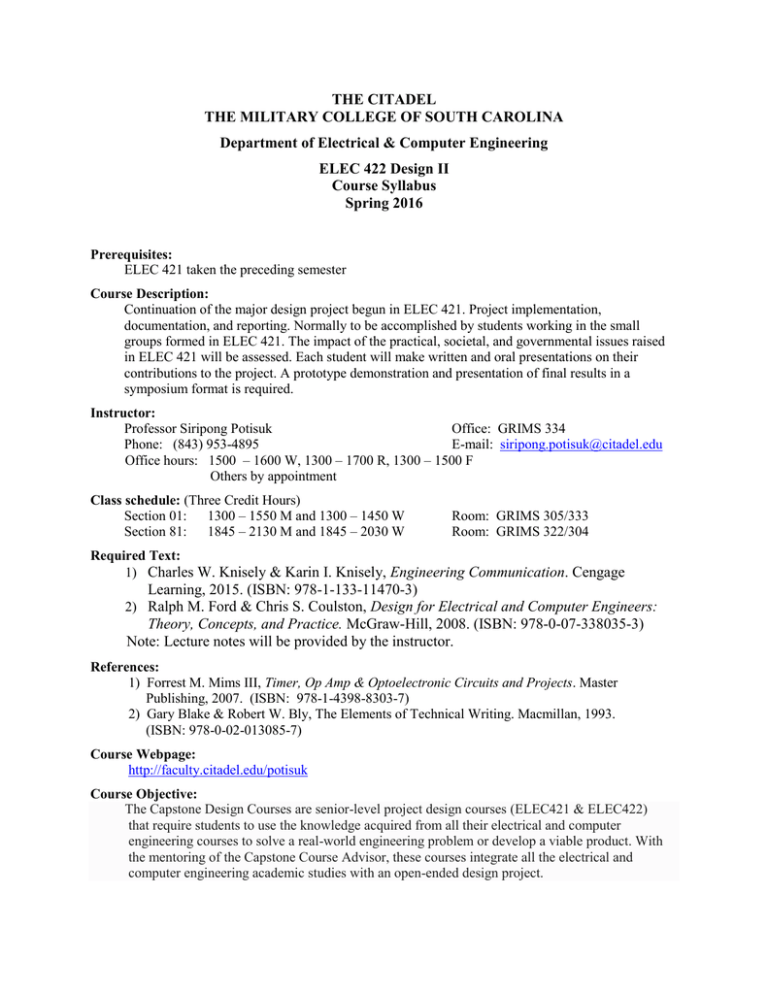
THE CITADEL THE MILITARY COLLEGE OF SOUTH CAROLINA Department of Electrical & Computer Engineering ELEC 422 Design II Course Syllabus Spring 2016 Prerequisites: ELEC 421 taken the preceding semester Course Description: Continuation of the major design project begun in ELEC 421. Project implementation, documentation, and reporting. Normally to be accomplished by students working in the small groups formed in ELEC 421. The impact of the practical, societal, and governmental issues raised in ELEC 421 will be assessed. Each student will make written and oral presentations on their contributions to the project. A prototype demonstration and presentation of final results in a symposium format is required. Instructor: Professor Siripong Potisuk Office: GRIMS 334 Phone: (843) 953-4895 E-mail: siripong.potisuk@citadel.edu Office hours: 1500 – 1600 W, 1300 – 1700 R, 1300 – 1500 F Others by appointment Class schedule: (Three Credit Hours) Section 01: 1300 – 1550 M and 1300 – 1450 W Section 81: 1845 – 2130 M and 1845 – 2030 W Room: GRIMS 305/333 Room: GRIMS 322/304 Required Text: 1) Charles W. Knisely & Karin I. Knisely, Engineering Communication. Cengage Learning, 2015. (ISBN: 978-1-133-11470-3) 2) Ralph M. Ford & Chris S. Coulston, Design for Electrical and Computer Engineers: Theory, Concepts, and Practice. McGraw-Hill, 2008. (ISBN: 978-0-07-338035-3) Note: Lecture notes will be provided by the instructor. References: 1) Forrest M. Mims III, Timer, Op Amp & Optoelectronic Circuits and Projects. Master Publishing, 2007. (ISBN: 978-1-4398-8303-7) 2) Gary Blake & Robert W. Bly, The Elements of Technical Writing. Macmillan, 1993. (ISBN: 978-0-02-013085-7) Course Webpage: http://faculty.citadel.edu/potisuk Course Objective: The Capstone Design Courses are senior-level project design courses (ELEC421 & ELEC422) that require students to use the knowledge acquired from all their electrical and computer engineering courses to solve a real-world engineering problem or develop a viable product. With the mentoring of the Capstone Course Advisor, these courses integrate all the electrical and computer engineering academic studies with an open-ended design project. Course Outcomes: The Accreditation Board for Engineering and Technology (ABET) requires that accredited engineering programs demonstrate that their graduates have: (a) An ability to apply knowledge of mathematics, science, and engineering (b) An ability to design and conduct experiments, as well as to analyze and interpret data (c) An ability to design a system, component, or process to meet desired needs within realistic constraints (d) An ability to function on multi-disciplinary teams (e) An ability to identify, formulates, and solves engineering problems (f) An understanding of professional and ethical responsibility (g) An ability to communicate effectively (h) The broad education necessary to understand the impact of engineering solutions in a global and societal context (i) A recognition of the need for, and an ability to engage in life-long learning (j) A knowledge of contemporary issues (k) An ability to use the techniques, skills, and modern engineering tools necessary for engineering practice. Grading Policy: Project/Prototype Demonstration Final Technical Report CEEDS Paper/Presentation Status Reports Poster Presentation Participation, Leadership, and Teamwork (individually assessed) Project Web page & In-class Assignments 30% 20% 20% 10% 10% 5% 5% Class Attendance/Activities Participation Policy: Class attendance is mandatory. Student is required to notify the instructor, if possible, in advance should it be necessary to miss a class for any reason and will be responsible for any material missed. Absences in excess of 20% of the class meetings will result in a failing grade for the course. Unexcused absence will result in a zero for that class period. Excused absence will be granted under extreme circumstances only. Classroom Policy: Classroom environment is an important factor for effective learning. Students are expected to strictly follow certain rules and regulations so as not to create unnecessary distractions and interruptions during class. 1) Food and drinks are strictly prohibited in the classroom. 2) All electronic devices with audible alarms (cell phones, pagers, watches etc.) must be turned off. 3) Students are expected to show up to class on time. Attendance will be called at the beginning and/or ending of every class. 4) Students are to refrain from talking to other students during class. Extraneous conversation creates noise and diminishes one’s ability to concentrate and pay attention. Special Accommodations: Any students requiring special accommodations for learning disabilities should provide the instructor with verifiable written documentation of their needs as early in the semester as possible (i.e., within the first two weeks of the semester). This will ensure that the students have ample opportunity to succeed in their academic pursuits. To request academic accommodations, students must register with the Academic Support Center at 953-1820. Academic Honor Policy: While it is permissible and recommended to rely on fellow students for assistance outside of classroom, it is not permissible to copy any portion of another student's work and pass it off as your own. Cheating and/or plagiarism in any form will be fully prosecuted under the Citadel honor code. Important Dates: Monday, January 18th Tuesday, January 19th Monday, January 25th Tuesday, January 26th Saturday, February 13th Tuesday, February 16th Monday, March 7th Wednesday, March 16th Friday, March 18th Friday, March 25th March 31st – April 2nd Sunday, April 3th Wednesday, April 6th Wednesday, April 13th Wednesday, April 20th Monday, April 25th Martin Luther King Jr. Day (No classes for SCCC and CGC) SCCC Drop/Add ends CGC Drop/Add ends Order of the Engineer Banquet Poster Presentation (Buyer Auditorium, MCH, 0900 – 1200) Engineers Week Banquet (Holliday Alumni Center – HAC, 1800 – 2000) CGC Last Day to Withdraw With A “W” SCCC Last Day to Withdraw With A “W” Leadership Symposium (No Afternoon Classes) Spring Break Begins After Last Class 2016 IEEE Southeastcon Hardware Competition (Norfolk, Virginia) Spring Break Ends CEEDS Paper Submission CEEDS Presentation (Graham Copeland Auditorium, 1700 – 2200) Final Specifications Submission Last Day to Schedule Project/Prototype demonstration Final Technical Report Submission Note: Some of these dates will definitely change as more information becomes available. Lesson Plan: Class Date M 01/11 W 01/13 M 01/18 W 01/20 Content Introduction (sec. 81) Introduction (sec. 01), Laboratory (sec. 81) No class (MLK Day) Laboratory Reading Assignment/Deliverables Knisely & Knisely, Chapter 12 & Appendix III Order of The Engineer Banquet – Tuesday, 01/26 M 01/25 Poster Preparations & Presentations W 01/27 M 02/01 W 02/03 Laboratory Ethics in Engineering Design 1st Oral and Written Status Report Ford & Coulston, Chapter 11 M 02/08 Legal Issues/Considerations in Design Ford & Coulston, Chapter 11 Knisely & Knisely, Chapter 9 W 02/10 Laboratory Engineers Week Poster Presentation – Saturday, 02/13, 0900 – 1200, Buyer, MCH M 02/15 Design Review Notes Engineers Week Banquet – Tuesday, 02/16, 1800, HAC W 02/17 Laboratory M 02/22 System Reliability Ford & Coulston, Chapter 8 W 02/24 2nd Oral and Written Status Report Class Date M 02/29 W 03/02 M 03/07 W 03/09 M 03/14 W 03/16 M 03/21 W 03/23 M 03/28 W 03/30 M 04/04 W 04/06 M 04/11 W 04/13 M 04/18 W 04/20 M 04/25 Content Testing Principles & Guidance Laboratory Elements of Technical Reports/Papers CEEDS Paper Overview Laboratory Laboratory Laboratory Revising Reports Engineering Toolbox &Visual Elements 3rd Oral and Written Status Report Spring Break IEEE Team(s) Travel to Norfolk, Virginia Laboratory Laboratory Laboratory The Citadel Electrical Engineering Design Symposium (CEEDS) Presentations Project/Prototype Demonstration Project/Prototype Demonstration Project/Prototype Demonstration Reading Assignment/Deliverables Ford & Coulston, Chapter 7 Knisely & Knisely, Chapters 3 & 4 IEEE Standards & Templates Knisely & Knisely, Chapters 5 & 6 1st draft of CEEDS paper due CEEDS Paper Submission Final Specifications Submission Final Report Submission

